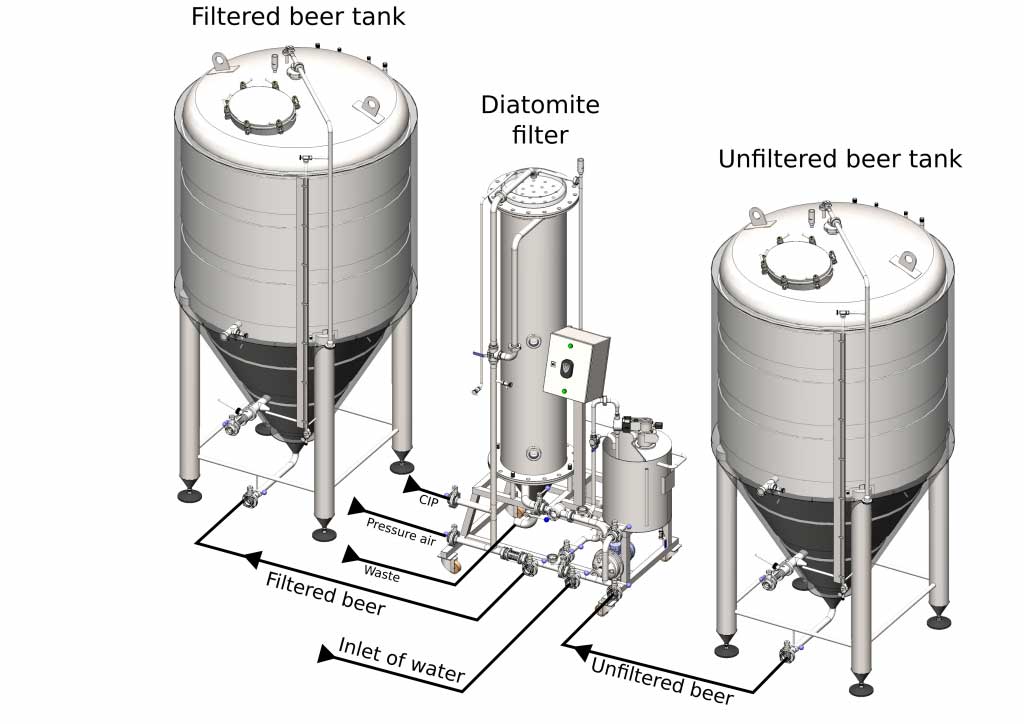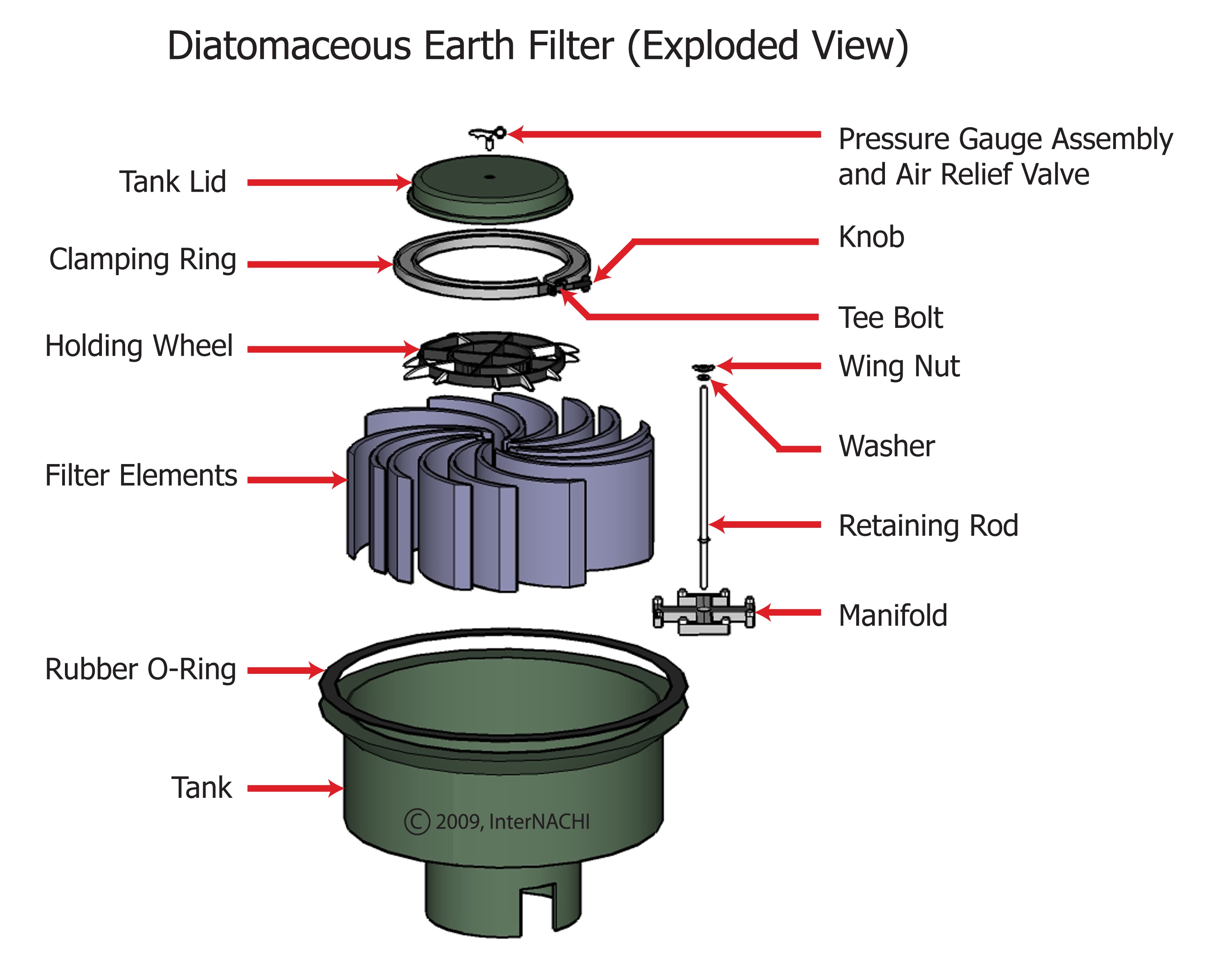Diatomaceous Earth Filtering: A Natural Solution for Effective Filtration
Diatomaceous Earth Filtering: A Natural Solution for Effective Filtration
Blog Article
Opening the Perks of Diatomaceous Earth Filtering for Pure and Clean Water
The expedition of diatomaceous planet (DE) filtering provides an engaging alternative for those looking for reliable and lasting water purification methods. As the need for tidy water continues to climb worldwide, understanding the multifaceted applications and advantages of DE filters might disclose vital insights for both house and commercial usage.
What Is Diatomaceous Planet?
Diatomaceous earth, frequently described as DE, is a naturally occurring sedimentary rock made up largely of the fossilized remains of little, water microorganisms known as diatoms. These single-celled algae are abundant in silica, which is the main component of DE. The distinct framework of diatomaceous earth is composed of tiny, permeable bits that give a high surface, making it a reliable filtering tool.
DE is usually harvested from old lake beds and down payments, which have gathered over countless years. It looks like a fine, white to beige powder, and its chemical composition mainly includes silicon dioxide, in addition to trace amounts of numerous minerals. This composition is what offers DE its remarkable residential properties.
Along with its application in water filtration, diatomaceous planet is used in a variety of industries, consisting of agriculture, food storage, and insect control. Its capacity to take in moisture and its abrasive top qualities make it an important resource in these fields. Generally, diatomaceous earth sticks out as an eco-friendly choice for various applications due to its all-natural beginning and effectiveness in filtration procedures.

Exactly How Diatomaceous Earth Filtering Functions

When water travels through a diatomaceous earth filter, the fine fragments are captured in the detailed network of small pores. The size and form of these pores are vital, as they are made to target particular pollutants while permitting tidy water to stream via. As water actions through the filter medium, the mechanical action of the diatomaceous planet records larger bits, while smaller contaminants are taken in or literally obstructed.
Furthermore, the surface area provided by diatomaceous earth is substantial, enhancing its ability to hold impurities. This results in a progressive accumulation of trapped fragments, which can be periodically removed via a backwashing process. This technique makes certain regular filtration efficiency and adds to the total efficiency of keeping clean and pure water.
Benefits Over Typical Filtering
When comparing diatomaceous planet filtering system to standard filtration techniques, several advantages emerge that improve water filtration efficiency. Among the key benefits is the remarkable filtration capability of diatomaceous earth (DE), which can eliminate smaller sized particles and contaminations that standard filters might miss. The microscopic structure of DE permits it to record impurities, including germs and protozoa, leading to cleaner water.
Additionally, diatomaceous earth filters have a tendency to have a longer life-span than standard media, lowering the regularity of replacement and upkeep. This longevity not just lowers operational costs but also reduces waste, adding to even more sustainable techniques. DE filters additionally run at lower pressure, which can bring about power cost savings in massive applications.
Another significant advantage is the versatility of diatomaceous planet. It can be utilized properly in various contexts, from municipal water therapy facilities to specialized commercial applications (diatomaceous earth filtering). The natural composition of DE makes it an environmentally friendly choice, cost-free from harmful chemicals and toxins usually connected with artificial filtering systems
Applications in Household and Market
Numerous applications of diatomaceous earth filtering system can be found in both family and industrial settings, highlighting its adaptability and effectiveness in water purification. In domestic atmospheres, diatomaceous earth (DE) filters are generally utilized in swimming pools, efficiently catching debris and microorganisms, thus maintaining water quality and health. Furthermore, many families utilize DE in home water filtration systems, where it offers to get rid of contaminations, sediment, and hazardous pathogens, making sure secure alcohol consumption water.
In commercial applications, diatomaceous earth filtering is indispensable to various industries, consisting of food and beverage production, pharmaceuticals, and wastewater treatment. In the food sector, DE is used in the filtration of beer and red wine, facilitating the removal of yeast and other particulates while maintaining the drink's flavor account. In addition, in wastewater treatment facilities, DE filters play a vital duty in boosting water top quality by capturing contaminants and promoting the recycling of water sources.
The performance of diatomaceous planet in both click resources home and industrial applications highlights its vital duty in promoting tidy water gain access to, adding to public wellness, and supporting lasting methods.

Picking the Right DE Filter
Picking the appropriate diatomaceous planet (DE) filter is important for making sure optimal water filtration, whether for industrial or property usage. diatomaceous earth filtering. The choice of a DE filter relies on numerous vital variables, consisting of the particular application, flow rate demands, and the preferred degree of filtering
First, assess the volume of water to be filtered. For property use, smaller sized filters suffice, while commercial applications might require bigger, high-capacity systems. Next off, consider the flow rate; it is very important to choose a filter that can deal with the needed throughput without compromising water quality.
Additionally, review the purification degree; DE filters can be found in different qualities, impacting the removal of particulates and pollutants. As an example, higher-grade filters are excellent for applications needing rigid pureness levels.
Last but not least, think about the upkeep demands and the availability of substitute DE powder. Filters that are less complicated to preserve and have readily offered materials will certainly decrease downtime and functional expenses. By carefully thinking about these elements, one can select a DE filter that meets details needs, ensuring the shipment of risk-free and clean water.
Conclusion
In summary, diatomaceous earth filtering system represents a substantial improvement in water purification innovation, offering improved effectiveness and effectiveness in recording contaminations. Embracing diatomaceous earth filtering can lead to improved public health and wellness outcomes and better access to tidy water.
The expedition of diatomaceous earth (DE) filtering system provides an engaging choice for those seeking visit our website efficient and lasting water purification approaches.When comparing diatomaceous planet filtering to traditional purification methods, a number of benefits arise that enhance water purification performance.Many applications of diatomaceous earth filtering system can be discovered in both family and industrial settings, highlighting its versatility and performance in water purification. In residential settings, diatomaceous earth (DE) filters are typically employed in swimming pools, successfully recording debris and microbes, continue reading this consequently preserving water clarity and hygiene. In wastewater treatment centers, DE filters play a crucial role in boosting water high quality by capturing impurities and promoting the recycling of water resources.
Report this page